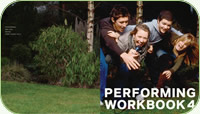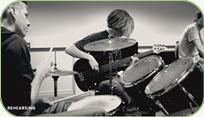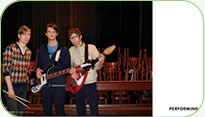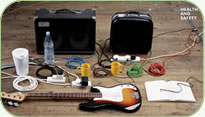 workbook 4
workbook 4 Performing
Workbook 4 contains 5 chapters
Chapter 1: Improving your skills
Chapter 2: Rehearsing
Chapter 3: Performing
Chapter 4: Health and Safety
Chapter 5: Equipment
 Your instrumental and technical skills are the cornerstone of your work as a performer, whether you are a singer, instrumentalist or DJ. These skills reflect your competence in the areas of technical skill, knowledge of different styles and genres, musical interpretation and the art of communicating your message to your audience.
Your instrumental and technical skills are the cornerstone of your work as a performer, whether you are a singer, instrumentalist or DJ. These skills reflect your competence in the areas of technical skill, knowledge of different styles and genres, musical interpretation and the art of communicating your message to your audience.
So you want to be a working musician?
This chapter covers the first basic questions – am I any good? Can I play my instrument well? How good do I have to be? When will I know I’m good enough?
Go to chapter
1 now
 The rehearsal process is the backbone of any band, orchestra or group performance. For every gig you go to see, while the band may only be on stage for an hour, many, many more hours have been put in during rehearsals to make the performance a success.
The rehearsal process is the backbone of any band, orchestra or group performance. For every gig you go to see, while the band may only be on stage for an hour, many, many more hours have been put in during rehearsals to make the performance a success.
Effective rehearsal management is crucial for getting the best out of the time spent rehearsing. Inexperienced musicians and bands often waste many hours by not managing their time effectively. Planning rehearsals, setting targets for what is to be achieved out of each rehearsal and sticking to deadlines all help the rehearsal process run more smoothly.
Go to
Chapter 2 now
 Performing is about ‘taking your music out’ – be it playing a gig, doing a couple of songs at an open mic night or folk club, playing your DJ set at a friend’s party, busking, or playing a professional concert.
Performing is about ‘taking your music out’ – be it playing a gig, doing a couple of songs at an open mic night or folk club, playing your DJ set at a friend’s party, busking, or playing a professional concert.
You might write great songs, or be a fantastic musician – but if your performance sends people to sleep, you’ll never get the credit you deserve.
You can improve the impact of your performance by careful planning – and by watching out for common problems you’re likely to face when gigging and touring.
Most musicians and DJs have to perform in order to make their name and forge a career in music.
Go to Chapter 3 now
 Most artists and managers would be extremely alarmed to find out that even without signing any documentation, when a band is formed, there is a presumption in law that a partnership has been formed. Even more alarming is the fact that UK partnership law is governed by the Partnership Act 1890, legislation which is over 100 years old and considered by many lawyers to be antiquated and unnecessarily complex.
Most artists and managers would be extremely alarmed to find out that even without signing any documentation, when a band is formed, there is a presumption in law that a partnership has been formed. Even more alarming is the fact that UK partnership law is governed by the Partnership Act 1890, legislation which is over 100 years old and considered by many lawyers to be antiquated and unnecessarily complex.
This chapter will help you to understand the legal implications of partnership law, and examines alternatives such as setting up a limited company.
Go to Chapter 4 now
 This chapter tells you about things you need to do to keep yourself, the people you work with and your audience as safe as possible whilst you’re working.
This chapter tells you about things you need to do to keep yourself, the people you work with and your audience as safe as possible whilst you’re working.
You need to know this for three reasons:
You need to work as safely as possible so you can have a long and successful career.
Whenever and wherever you work in music you have a legal responsibility to work within the Health and Safety laws. If you do anything that breaks these laws you could be prosecuted for a criminal offence.
Serious and life-threatening problems do happen – not only could you injure yourself, but you could also be liable for any injury caused to others, leaving you open to legal claims against you.
Go to Chapter 5 now
| Description | Data size | Download time (estimates) |
| Index of workbook 4 | 164Kb | 56K Modem = 24 sec | Broadband = 3 sec |
| Complete Workbook 4 | 8900kb | 56K Modem = 22 minutes | Broadband = 2 min 20s |
All downloads are in Adobe Acrobat PDF format. |
||








